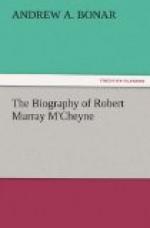His desire to grow in acquaintance with Scripture was very intense; and both Old and New Testament were his regular study. He loved to range over the wide revelation of God. “He would be a sorry student of this world,” said he to a friend, “who should forever confine his gaze to the fruitful fields and well-watered gardens of this cultivated earth. He could have no true idea of what the world was, unless he had stood upon the rocks of our mountains, and seen the bleak muirs and mosses of our barren land; unless he had paced the quarter-deck when the vessel was out of sight of land, and seen the waste of waters without any shore upon the horizon. Just so, he would be a sorry student of the Bible who would not know all that God has inspired; who would not examine into the most barren chapters to collect the good for which they were intended; who would not strive to understand all the bloody battles which are chronicled, that he might find ’bread out of the eater, and honey out of the lion.’”—(June 1836.)
His anxiety to have every possible help to holiness led him to notice what are the disadvantages of those who are not daily stirred up by the fellowship of more advanced believers. “I have found, by some experience, that in the country here my watch does not go so well as it used to do in town. By small and gradual changes I find it either gains or loses, and I am surprised to find myself different in time from all the world, and, what is worse, from the sun. The simple explanation is, that in town I met with a steeple in every street, and a good-going clock upon it; and so any aberrations in my watch were soon noticed and easily corrected. And just so I sometimes think it may be with that inner watch, whose hands point not to time but to eternity. By gradual and slow changes the wheels of my soul lag behind, or the springs of passions become too powerful; and I have no living timepiece with which I may compare, and by which I may amend my going. You will say that I may always have the sun: And so it should be; but we have many clouds which obscure the sun from our weak eyes.”—(Letter to Rev. H. Bonar, Kelso.)
From the first he fed others by what he himself was feeding upon. His preaching was in a manner the development of his soul’s experience. It was a giving out of the inward life. He loved to come up from the pastures wherein the Chief Shepherd had met him—to lead the flock entrusted to his care to the spots where he found nourishment.
In the field of his labor he found enough of work to overwhelm his spirit. The several collieries and the Carron Ironworks furnish a population who are, for the most part, either sunk in deep indifference to the truth, or are opposed to it in the spirit of infidelity. Mr. M’Cheyne at once saw that the pastor whom he had come to aid, whatever was the measure of his health, and zeal, and perseverance, had duties laid on him which were altogether beyond the power of man to overtake. When he made a few weeks’ trial, the field appeared more boundless, and the mass of souls more impenetrable, than he had ever conceived.




